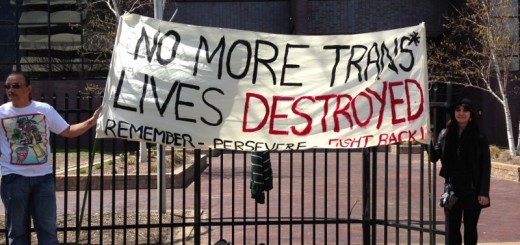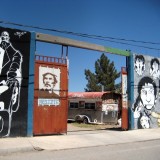Retired miners struggle to retain healthcare coverage as coal companies declare bankruptcy

In the recent wave of coal company bankruptcies, CEOs have been awarded multi-million dollar bonuses, while at the same time the companies are seeking release from their decades-old obligation to cover lifetime health benefits for retirees who are members of the United Mine Workers Union of America. The union says a bill in Congress that would protect their members’ healthcare coverage is critical to their well-being. FSRN’s Melinda Tuhus reports from the coal fields of southern West Virginia.
Since 1947, retired members of the United Mine Workers Union have been entitled to lifetime medical benefits to deal with the health risks of a dirty, dangerous job, including black lung, which has seen a resurgence in recent years.
Sitting in the mineworkers’ union office in Charleston, retired miner Ron Pauley says their health benefits have always been top priority.
“Well, in the beginning, during all this contract negotiation stuff, we sort of put wages over to the side because we figured we had health care – medical – for life, so we was willing not to strike or nothing as much for wages as to maintain our health care benefits,” Pauley explains. “And now, with all these bankruptcies and the way the bankruptcy law is, we’re in danger of losing that.”
In the past few years, more than 50 U.S. coal companies have declared bankruptcy as the price of fracked methane gas undercuts that of the thermal coal used by power plants and as Chinese demand has dropped for metallurgical coal used in steel making, which is the coal West Virginia produces. Even the biggest companies – Arch, Alpha Natural Resources, Patriot and Peabody – have gone under, restructuring as smaller companies or selling off assets to new firms on the scene.
Ron Pauley began mining in 1980 at a small family-oriented operation, where he said the workers were treated well. It was bought out by Patriot, and he retired two years ago after 33 years in the mine. He said he went through bankruptcy twice with Patriot, in 2012 and 2015.
“First time they got the bonuses – and I believe the first bonuses was in the tens of millions of dollars. But then – same people, managing the same company – filed bankruptcy again,” Pauley recalls. “Same people that got the bonuses the first time got eight-point so many million again in bonuses. So they double-dipped twice on that, and the judge gave it to ‘em, no questions asked.”
In mid-August, top executives at Peabody – the world’s biggest private sector coal company – were granted a total of $12 million in bonuses if they hit performance targets through the end of next year.
Between 2013 and 2014, the number of coal workers and the price of coal nationally both dropped between six and seven percent. The percentage of unionized miners has plummeted over the years.
Now in southern West Virginia – the historic battleground for unionization, along with eastern Kentucky – non-union miners outnumber unionized workers in underground mines more than 6 to 1, and for surface mines it’s 10 to 1, according to federal data from the Energy Information Administration. There are only about 1,800 active unionized miners in District 17, which covers 36 counties in the southern part of West Virginia.
Now the union is promoting the Miners’ Protection Act, with companion bills in the U.S. House and Senate. The legislation would provide money from the Abandoned Mine Land Fund to cover the retired miners’ health insurance.
Joe Carter, vice president of District 17, says it’s money that the coal companies pay for the reclamation of areas that have been mined, and there’s about $3 billion currently in the fund: “We’d basically be asking for use of some of the interest money from that fund. And it’s not taxpayer dollars. It’s money that the miners helped the companies make.”
The bill would also draw on money in the federal treasury – up to $490 million – if the interest from the Abandoned Mine Land Fund doesn’t cover the entire need of retired miners whose companies have gone bankrupt. Whatever money in that pot isn’t used to cover health costs will go toward shoring up the miners’ pension funds.
In the next couple of years, 34,000 union retirees stand to lose their health benefits, Carter says. He adds that pensions are also at risk due to all the bankruptcies. The pension fund was about 90 percent funded as of 2008, but lost half its value in the Great Recession.
All five members of West Virginia’s Congressional delegation are co-sponsors of the Miners Protection Act, and the total number of sponsors is 62 in the House and 18 in the Senate. One name that’s missing is that of Kentucky Senator and Senate President Mitch McConnell, even though many eligible miners live in his state. Pauley says he and other miners have lobbied every Congress member and Senator who would meet with them, but so far the bill – introduced last year – has failed to move forward.
Some news reports have said it’s an either/or choice between paying for retirees’ health insurance or paying for environmental remediation of mine sites, a narrative pitting workers against the environment, but Carter says that both needs can be met.
And Dustin White, a community organizer with the Ohio Valley Environmental Coalition, agrees, saying, “We feel that coal companies tend to treat their employees the same way they treat the environment, with little to no respect. And this is something that’s definitely needed for the coal miners who have been left in this position by the industry.”
The United Mine Workers Union is sponsoring a rally in Washington, D.C., on Sept. 8 to press Congress to take the pause button off of – and pass – the Miners Protection Act.

















